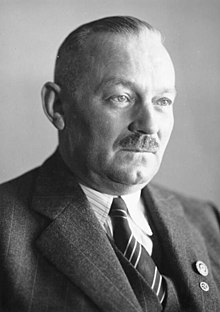Manfred Freiherr von Killinger
| Manfred Freiherr von Killinger | |
|---|---|
 |
|
| Minister-President of the Free State of Saxony | |
|
In office 1933–1935 |
|
| Preceded by | Walter Schieck |
| Succeeded by | Martin Mutschmann |
| Personal details | |
| Born |
14 July 1886 Gut Lindigt, German Empire |
| Died | 2 September 1944 (aged 58) Calea Victoriei, Kingdom of Romania |
| Political party | National Socialist German Workers' Party (NSDAP) |
| Religion | Lutheran |
Manfred Freiherr von Killinger (14 July 1886 – 2 September 1944) was a German naval officer, Freikorps leader, military writer and Nazi politician. A veteran of World War I and member of the Marinebrigade Ehrhardt during the German Revolution, he took part in the military intervention against the Bavarian Soviet Republic. After the Freikorps was disbanded, the antisemitic Killinger was active in the Germanenorden and Organisation Consul, masterminding the murder of Matthias Erzberger. He was subsequently a National Socialist German Workers Party representative in the Reichstag and a leader of the Sturmabteilung, before serving as Saxony's Minister-President and playing a part in implementing Nazi policies at a local level.
Purged during the Night of the Long Knives, he was able to recover his status, and served as Nazi Germany's Consul in San Francisco between 1936 and 1939. As Ambassador to the Slovak Republic in 1940, he played a part in enforcing antisemitic legislation in that country. In early 1941, Killinger was appointed to a similar position in Romania, where he first became noted for supporting Ion Antonescu during the Legionary Rebellion. Together with his aide Gustav Richter, he attempted to gain Romania's participation in the German-led Final Solution, thus pressuring Romanian authorities to divert focus from their own mass murder of Jews. Killinger oversaw German presence in Romania until 1944, and was the target of a notorious 1943 pamphlet by writer Tudor Arghezi. He committed suicide in Bucharest, days after King Michael's Coup of August 23, 1944 toppled the Antonescu regime.
...
Wikipedia
